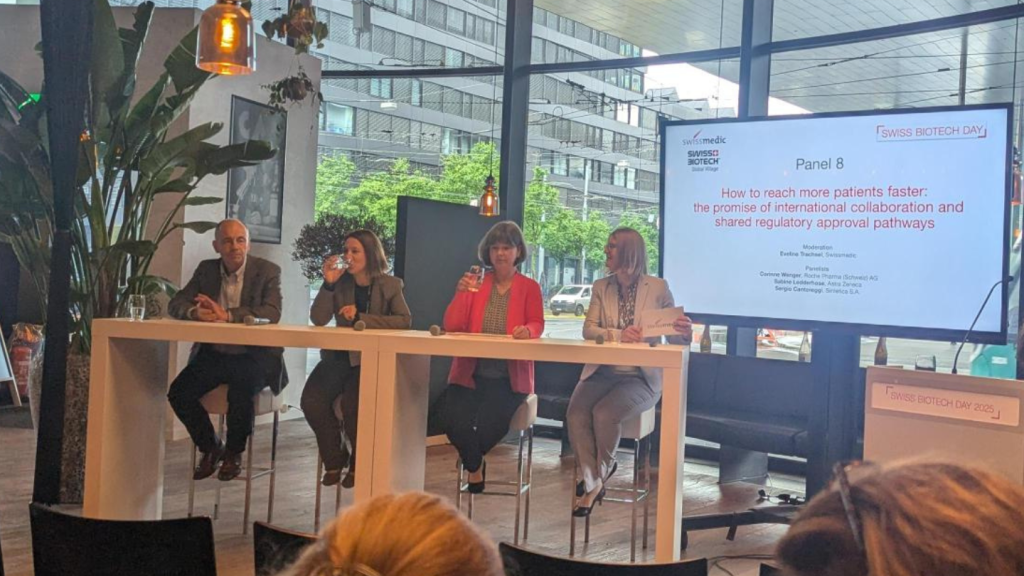
As the pharma industry navigates uncertainty caused by successive moves by the US administration, including international tariffs and drug pricing changes, experts at a recent conference stressed the importance of collaboration.
Swiss Biotech Day, which was held in Basel, Switzerland, on 5-6 May, brought together pharmaceutical industry leaders from across the world. One key theme for the event was ‘the power of international alliances,’ with many discussions focusing on international collaborations.

Discover B2B Marketing That Performs
Combine business intelligence and editorial excellence to reach engaged professionals across 36 leading media platforms.
Swiss Biotech Association CEO Michael Altorfer said: “International cooperation is in the heart of our city because our city lies in daily life in three countries….In these times, it’s important to be stable and predictable, to continue our policies as we always did, and will do in future—policies to support science, that leave it the independence it needs.”

Collaboration important for pipeline development
One of the main findings of a report released by the Swiss Biotech Association was how investment in the Swiss R&D space had increased in 2024 compared to 2023.
The report also highlighted partnerships forged by Swiss biotechs in 2024, such as AC Immune and Takeda Pharmaceutical’s Alzheimer’s immunotherapy deal; Epalinges, Switzerland-based Haya Therapeutics’ long non-coding RNA therapy deal with Eli Lilly; and a partnership between Switzerland-based Basilea Pharmaceutica and Innoviva to commercialise the former’s antibiotic.

Sanofi R&D head Houman Ashrafian spoke about the importance of collaboration in running the right trial for a therapy. He added that Sanofi has funding and guidance schemes available to help biotechs that may be struggling to fully fund a study, and stressed the importance of being thoughtful about clinical study designs.

US Tariffs are shifting - will you react or anticipate?
Don’t let policy changes catch you off guard. Stay proactive with real-time data and expert analysis.
By GlobalData“Don’t mess up the clinical trial. It’s critically important… Doing the wrong trial with your asset will kill it very quickly,” he said.
Regulators are collaborating more with biotech
Tracy Laabs, PhD, head of innovation and strategic partnerships at Wyss Center for Bio and Neuroengineering, spoke about how the FDA is assisting with computing and neural interfacing and how companies are collaborating with regulators to make it easier to develop technology in this space without constant regulatory hurdles.

Laabs said it is important to initiate dialogue with the regulators early: “You have to be your own advocate, find the regulatory authorities and say, ‘Let’s build together a way that you can understand how my product might change over time so that you don’t have to go to the regulatory authorities every single week,’ essentially because it is just a software update.”
She was optimistic about the potential for the future of AI-driven diagnostics and therapeutics being developed in collaboration with regulatory authorities who are ready and willing to trust the technology.
Another way in which regulators are working more closely with industry leaders is through multi-agency approval pathways designed to assist companies in gaining wider global market approval more quickly. Three specific pathways were discussed: Project Orbis, the Access Consortium, and the Marketing Authorisation for Global Health Products (MAGHP), and how these can help accelerate drug approvals worldwide.
Generally, approval timelines in Switzerland are longer than in other regions, admitted Eveline Trachsel, head of medicinal product authorisation and vigilance at Swissmedic, the Swiss Agency for Therapeutic Products.
She said: “[The] reason for this is the so-called ‘submission gap’. This means that it takes longer for dossiers to get submitted to Swissmedic compared to other agencies.”

As per Trachsel, Swissmedic generally receives a dossier almost one year after it is received by the FDA, which lines up with drug approval dates in Switzerland being one year later than in the US. As a result, Swissmedic is asking companies to use multi-agency approval pathways that include the Swiss agency, where possible, to get earlier approval.
While this is an attractive approval pathway for small and medium-sized biotechs, these schemes are also being utilised by the big players, including AstraZeneca and Roche.
Roche’s regulatory affairs head Corrine Wenger said that, as a Swiss company, such pathways that speed up approval in the home nation are attractive.
Europe–US collaborations
As the US Government encourages a more country-centric approach, with tariffs and a push to onshore manufacturing, there are concerns about how this will impact the European pharma sector. Some impact from the Trump administration is already being felt globally, for example, with cuts to global funding for research grants and projects such as the US Agency for International Development (USAID).
Despite this, the US remains a crucial country in the pharmaceutical industry, so companies need to find solutions to these incoming changes.

Branden Berns, partner at Gibson, Dunn & Crutcher LLP, commented on the recent missed Prescription Drug User Fee Action (PDUFA) date for Needham, Massachusetts-based Stealth Therapeutics’ drug, which scared some biotech company executives who believed it was related to recent staffing cuts.
In March 2025, the Department of Health and Human Services (HHS) announced the layoffs of 10,000 employees, which included 3,500 jobs cut from the FDA. On 29 April, Stealth announced that the FDA said it would not be given an approval decision for the drug elamipretide, for the treatment of the ultra-rare disorder Barth syndrome, before the assigned PDUFA date.
Apart from the Covid-19 pandemic period, there are only two to four times that the FDA misses PDUFA targets.
“A lot of the FDA funding is based on meeting these targets at a 90% level,” Berns said.
“I think for now, we can breathe a sigh of relief that the FDA hasn’t broken the system that everyone has come to rely on.”
Nonetheless, FDA commissioner Martin Makary said the agency still intends to meet these targets.
With the push for international collaborations comes an appreciation for local customs. Experts at the conference emphasised the importance of Europeans understanding the US culture and how US investors respond to companies seeking funding. While Europe has a much more science-based approach with funding pitches, US investors like to know the story behind a company.
Additionally, it is also important to connect and speak with investors, said Matthias Bodenstedt, CFO of Swiss biopharma MoonLake Immunotherapeutics, who added that he travels to the US up to 15 times per year to maintain a good relationship with investors.




